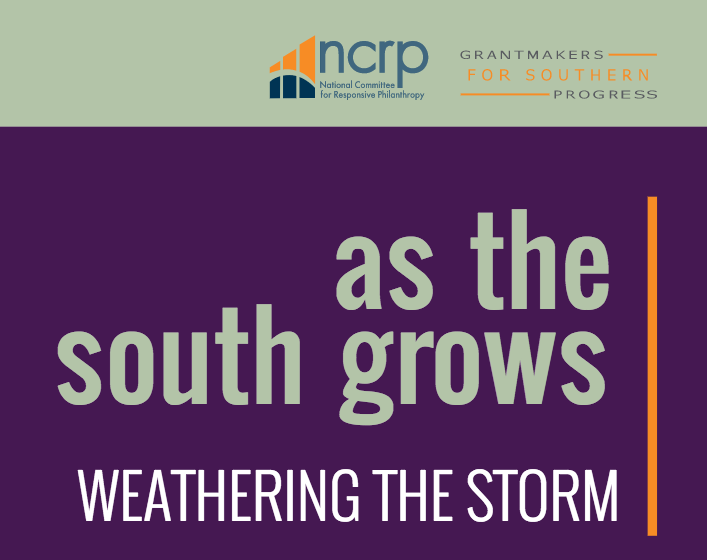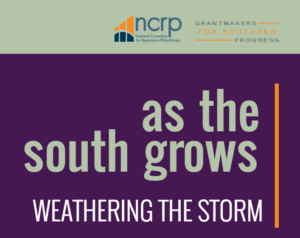Unprecedented Storms Offer Chance to Build People Power

 The National Committee for Responsive Philanthropy (NCRP) has been engaged for the last two years in an ongoing partnership with Grantmakers for Southern Progress to highlight the opportunities for investment in long-term structural change work in the South in our As the South Grows series. Despite the historic lack of philanthropic investments in the region and in the face of entrenched, racialized poverty, Southern communities stand ready to build movements for justice that have the potential to change the country.
The National Committee for Responsive Philanthropy (NCRP) has been engaged for the last two years in an ongoing partnership with Grantmakers for Southern Progress to highlight the opportunities for investment in long-term structural change work in the South in our As the South Grows series. Despite the historic lack of philanthropic investments in the region and in the face of entrenched, racialized poverty, Southern communities stand ready to build movements for justice that have the potential to change the country.
The third report in the series, Weathering the Storm, elevates the stories of Southern activists working at the intersection of economic, racial, and climate justice. It includes lessons from marginalized Southern communities on the frontlines of climate change and their cross-issue, cross-constituency strategies to break the hold that extractive and exploitative industry has on our politics—a hold that exacerbates the already catastrophic effects of environmental degradation and climate change each day.
It includes concrete and actionable tips for grantmakers and donors who want to do short-term and long-term environment and climate philanthropy in the South “well”:
- Identify opportunities to fund climate, economic and social resilience and solutions in the South within current grantmaking priorities or expand priorities to include those strategies.
- Deploy your financial, human, and political capital to ensure underrepresented communities—those most impacted by environmental injustice—are meaningful partners in climate resilience conversations.
- Seek reparative, healing, honest relationships between grantee and grantor and within grantee communities.
- Make a healthy, resilient social change infrastructure a strategic priority.
The bottom line is this: Southern communities are on the front lines of an ongoing global climate crisis, one whose threats grow in scope and magnitude each day. In many ways, Southerners have been among the first to learn what it’s like to live with a new climate—the more hostile one we have created for ourselves over decades of living outside our planetary means.
More intense storms, hastening sea level rise, agricultural disturbances and other climate factors present an existential threat to Southern communities and an uncontainable, exponential one for the country. Many Southerners know this; they understand the threats and their enablers in concentrated, reactive, corporate-backed power. Although many of those same Southerners are organizing and mobilizing around a resilient and just new future, foundation investment in Southern communities does not match that reality.
Fear and Hope for Solutions
When we spoke to climate and environment activists in the South, the trauma of past storms and fear of what is to come was threaded through our interviews.
What dominated those conversations, though, was not sorrow, but the conviction that Southern communities have the solutions to the climate challenges we all face.
“[The South has] a shared history that connects people: the history of slavery, oppression and rebellion. There’s one thing people in Mississippi can know about people in Alabama without having to even talk to them, and that’s ‘You survived and we survived. We’re both still here because we both have survival methods.’ Somewhere else they might see someone and say ‘Oh, you’re here.’ But when I see someone in the South it’s a different acknowledgement. It’s ‘We’re still here.’ It’s a collective ‘we.” – Colette Pichon-Battle, Executive Director of the US Human Rights Network
It seems sometimes that history is speeding up, our past is catching up to us, and the future holds unprecedented threats. Philanthropy’s response in the South and elsewhere must be unprecedented too.
For more information on the As the South Grows initiative, see the list of participating organizations.
